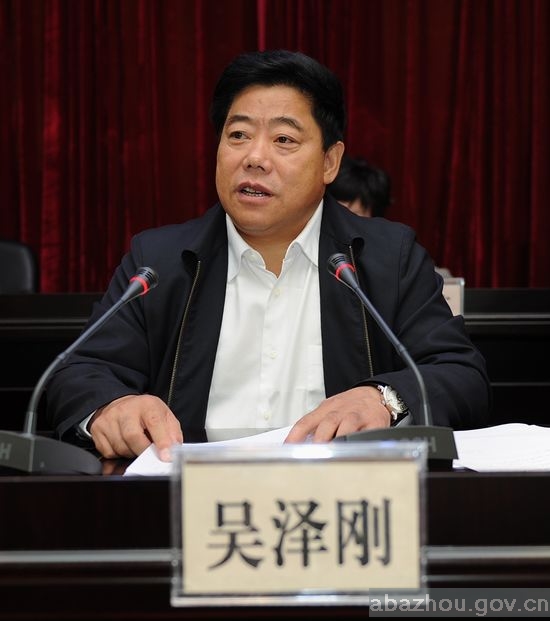Political motive behind self-immolations in Tibetan-populated regions
 0 Comment(s)
0 Comment(s) Print
Print E-mail Xinhua, March 7, 2012
E-mail Xinhua, March 7, 2012
Similarities found in self-immolations in China's Tibetan-populated regions have pointed to behind-the-scenes orchestration with a transparent political motive, officials said Wednesday.
 |
|
Wu Zegang [file photo] |
Wu Zegang, chief of the Aba Tibetan-Qiang autonomous prefecture of southwest China's Sichuan province, said that police have investigated self-immolations that occurred in Tibetan areas in the provinces of Sichuan, Qinghai and Gansu in recent months, finding that the victims were used by separatists to create chaos.
One outstanding similarity, he said, was that most of the self-immolaters had shouted separatist slogans like "Free Tibet" while setting themselves on fire.
"Moreover, photos revealing the daily lives of most of the self-immolaters had been sent in advance to seperatist forces abroad. These photos, contrasted by pictures depicting the self-immolation sites, were immediately dispersed by separatist forces to play up the situation," Wu said during a panel discussion by a delegation from Sichuan.
"To encourage self-immolations, they even offer a price of compensation for the dead. All these prove that self-immolations are pre-mediated political moves," he said.
The discussion took place during the ongoing annual meeting of the National People's Congress (NPC), China's legislature.
"The Dalai Lama clique and overseas separatist forces are leading Tibetan Buddhism onto the track of extremism. By touting self-immolaters as heroes and performing religious rituals to expiate the sins of the dead, they support and inspire self-immolations. They instigate people to emulate this behavior and are not hesitant to use terrorism to reach their objectives," Wu said.
Police investigations showed that a number of the self-immolaters were secularized monks with criminal records.
"The double-faced tactics of the Dalai Lama clique are alluring and deceptive. It is because of the beguilement and instigation of the Dalai Lama clique that self-immolations in China's Tibetan-populated regions appear contagious," Wu said.
Gyalto Lhorongchangpa, vice-chairman of the Garze Committee of the Chinese People's Political Consultative Conference (CPPCC) in Sichuan and a deputy to the National People's Congress, said that people from all religious sectors oppose the self-immolations.
"Self-immolations have largely affected the normal activities of Tibetan Buddhists and run counter to the teachings of Buddha," said Gyalto.
Liu Qibao, provincial Communist Party of China (CPC) chief of Sichuan, admitted that self-immolations are a problem in Sichuan, adding that efforts have been made to protect the culture of ethnic Tibetans.
"In Tibetan-populated regions, facilities and activities that uphold Tibetan culture can be found everywhere. We all have free access to Tibetan cultural faciltiies. Buddhist monks and nuns also enjoy social benefits. Public complaints about cultural repression do not exist. On the contrary, Tibetan culture is flourishing," said Liu.
According to a transcript posted on Tibet.cn, a media website that carries stories about the Tibet autonomous region, Zhu Weiqun, vice minister of the CPC Central Committee's united front department, and European authorities discussed a string of self-immolations that have occurred in Tibetan-populated regions since last March.
"There are 3,542 monasteries and 140,000 monks and nuns in Tibet and other Tibetan-populated regions. Most of the self-immolation cases, however, are related to the Kirti Monastery," he was quoted as saying.
"Why? The living Buddha of the Kirti Monastery staged an armed rebellion with the Dalai Lama in 1959 and fled abroad after their failure. He has served as the 'security minister' of the 'Tibetan government-in-exile' for a long time. His ministry is widely known for organizing bloodshed, sabotage and penetration," Zhu said.
The Dalai Lama clique's separatist activities are doomed to fail as self-immolations in a small number of monasteries cannot disrupt development trends in Tibetan-populated regions, said Li Changping, a member of the standing committee of the Sichuan Committee of the CPC and a deputy to the National People's Congress.
"Although a few monks and nuns have echoed the attempts of the Dalai Lama clique at a distance, these people cannot represent all Tibetans or stop development in these regions," Li said.
"Our fight with the Dalai Lama clique is not happening on an ethical or religious front, but is a serious political struggle," Li said.
"Unity and stability bring blessings, while separation and turmoil result in misfortune. The Tibetan people have been firm and resolute in their fight against the Dalai Lama clique, " Li said.
During a separate panel discussion by the Tibet Delgation open to press Wednesday afternoon, Padma Choling, chairman of the Tibet autonomous region said that no self-immolations had taken place in Tibet, adding that the situations of Lhasa and Tibet remaine stable overall.
"Wherever self-immolations happened, it was heart-struck.... We all live this life once. Life is the most precious, we should cherish our lives...Those who support and instigate self-immolations should be punished according to laws," said he.
"We hope no more people set themselves on fire...There are sufficient ways for people to express their views. It's no need to take such a radical act," said he.






Go to Forum >>0 Comment(s)